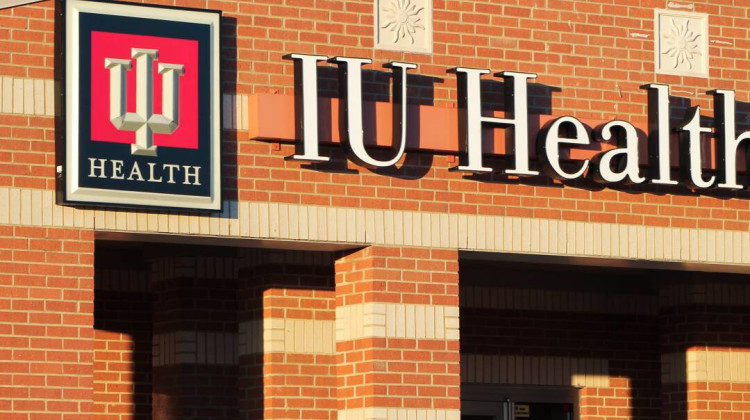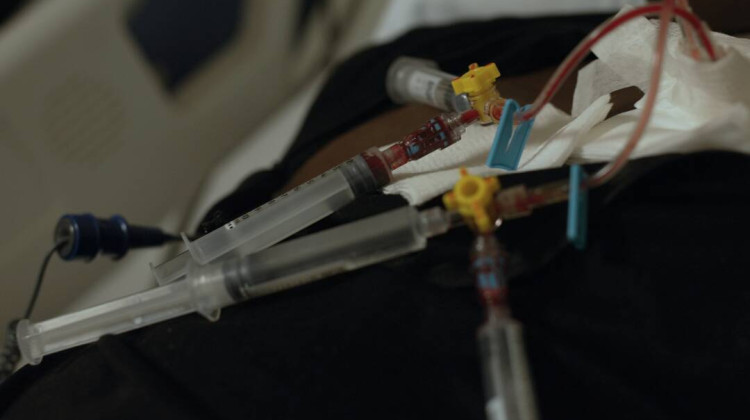
A protester by Elevance Health's headquarters in Indianapolis during a protest organized by the patient advocacy group People's Action on Nov. 14, 2022.
Provided by People's ActionDozens of patients and health care advocates protested by Elevance Health’s headquarters in Indianapolis on Monday to demand the health insurance giant stop denying insurance claims and be more transparent about its processes.
Protesters carried signs that read “No deaths for insurance greed” and “Who are you to decide if we live or die?”
The protest was organized by the patient advocacy group People’s Action as part of their Care Over Cost campaign. The organization helps people across the country appeal and overturn insurance claims denials from private health insurers.
In a signed letter addressed to CEO Gail Boudraux last week, the group asked Elevance Health, previously known as Anthem, to overturn claims and pre-authorizations denials and to be more transparent about the demographics of who gets denied coverage.
“What are they doing with our claims and with our money? We want them to share how much money they're making off of denying us our care,” one protester said.
Elevance Health and its broader network of insurers cover 47 million people across more than a dozen states. They operate both commercial insurance plans as well as privatized Medicaid plans.
The federal government does not collect data on commercial insurance plans to determine the rate of insurance claims denials for health plans that cover more than half of people in the U.S.
But such data is collected for Marketplace plans, which cover around 3 percent of Americans, or about 11 million people. An analysis of 2020 data found insurers deny roughly 1 in 5 in-network claims, according to the Kaiser Family Foundation. Reasons for claims denials included: lack of prior authorization or referral, exclusion of a service and denials based on medical necessity. More than 70 percent of denials are listed as “for all other reasons.”
Some of those denials are for pre-authorizations –– that is, a patient’s health care provider has stated that health services, such as tests, surgeries or preventive care, are necessary, but the insurer denies coverage of those services.
Patients can appeal denials, but the limited data that exists suggests very few do. People covered by Marketplace plans tend to appeal only 0.1 percent of in-network claims denials, and insurers uphold 62 percent of those appealed denials, according to the KFF analysis.
In a social media video posted on Twitter by People’s Action, patient advocates say that the cumbersome and opaque appeals process is a hindrance. They shared stories of personal struggles with getting insurance coverage for essential care for themselves and their loved ones.
“Lots of people just give up because insurers make this so difficult. We deserve the highest quality of care, regardless of our income,” said Bri Moss, Iowa Citizens for Community Improvement member leader.
“Anthem is treating me as ‘less than’ because I’m poor, because they think they can get away with it and make more money, and they’re doing this at the expense of my health,” she added.
People’s Action says that in listening sessions they’ve held across the country, many people said their biggest obstacle to receiving the health care services they need is not lack of insurance but the denial of services by private insurance companies like Elevance Health.
Elevance Health did not answer questions sent by WFYI about the company’s process for denying claims or whether they’re working to improve transparency.
In an emailed statement, a spokesperson said, “as a company that provides high-quality health benefits for 47 million people, we work every day to ensure that our consumers have access to proven medical services supported by the latest medical evidence.”
This story comes from a reporting collaboration that includes the Indianapolis Recorder and Side Effects Public Media — a public health news initiative based at WFYI. Contact Farah at fyousry@wfyi.org. Follow on Twitter: @Farah_Yousrym.
 DONATE
DONATE





 View More Articles
View More Articles



 Support WFYI. We can't do it without you.
Support WFYI. We can't do it without you.